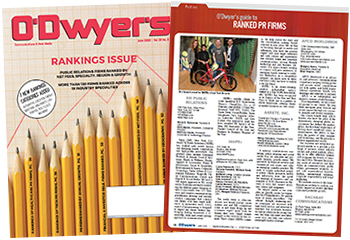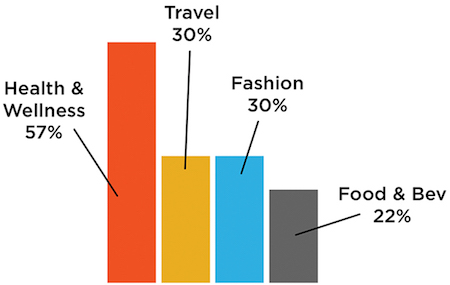 |
| Erin Weinberg |
Brands are being tested like never before amid a soft retail environment, supply chain disruptions and a new communications landscape. While there are bright spots—food and beverage, fitness, outdoor and some tech sectors—the impact is widespread, which has left marketers struggling to find the most appropriate way to connect and communicate with customers. But consumers are still paying attention, and brands that find ways to sustain—and even increase—relevance will be in a position to reap the benefits long term.
New research offers insight into how marketing leaders define and measure relevance, as well as challenges and solutions for ratcheting-up relevance. In early March 2020, just as news about the coronavirus began to pervade our daily lives, 360PR+ engaged Engine Group to survey 300 senior marketing executives, gauging opinions of their and other brands’ relevance. These marketing leaders speak for a broad range of sectors, including technology, finance, health and wellness, fashion, entertainment, food and beverage, travel and automotive.
Adaptability is key
 |
| This article is featured in O'Dwyer's Jun. '20 PR Firm Rankings Magazine. |
A dominating theme that surfaced from our research was adaptability. Respondents were clear that the ability to adapt, regardless of the circumstances, is undeniably critical to sustaining relevance. As one respondent stated, “The brand that is open to consistent change with the culture and environmental needs of the times is one that clearly demonstrates relevance.”
‘Relatability,’ ‘interest,’ ‘awareness’ most associated with relevance
“Brands that have created relatable content and an experience that motivates customers to remain brand loyal are the ones winning the fight for relevance,” explained another marketing leader who participated in the research.
Marketers cited sales, customer feedback and reviews as the most important metrics for tracking brand relevance, followed by brand recall and growth among new audiences. Related to customer feedback, larger brands are more likely than smaller businesses to associate engagement with relevance and believe that permission to innovate is the greatest benefit of relevance. Customer feedback and reviews are powerful forms of engagement and ones that PR can have a direct hand in driving for brands, teeing up the right content and resonant messaging and putting that in the right places for consumers to access it, and adding third-party endorsements via media and influencers to propel engagement.
Survey participants spoke extensively about relevance being more than just products and services. They shared that beyond creating innovative products, the brands they felt were most relevant were innovative with their hiring practices and how they approach marketing.
It’s important for PR teams to be brought in to product and organizational innovation discussions as they can provide platforms for thought leadership—elevating brands, businesses and executives in the marketplace. Such was the case with our vacation rental client Vrbo, which was planning to roll out a set of new tools, including a filter to make it easier for families to find ideal getaways within driving distance of their own homes. The timely tool elevated Vrbo as a bellwether for the travel industry and gave vacationers reason to travel again, only a little closer to home.
Another relevance-building strategy emphasized by marketers entails creating more content for their owned channels. Tommee Tippee, the popular infant and toddler feeding brand (and an agency client), is giving parents new reasons to #SmileOn by helping them de-stress with resources like on-demand yoga classes and virtual museum tours.
Another example is Pete and Gerry’s Organic Eggs (one of our clients as well). Like all grocery brands, its objective is to move product off shelves, but the brand is also sharing what it knows about raising free range, happy hens for consumers interested in the modern homesteading movement—a hot topic! The content reminds us how committed Pete and Gerry’s is to supporting small family farms and gives consumers -real-world guidance and expertise on raising their own happy hens.
Being true to your brand
 Having a well-articulated and authentic purpose ranked high on the list for what makes brands in certain industries most relevant with customers. Having a well-articulated and authentic purpose ranked high on the list for what makes brands in certain industries most relevant with customers. |
Understanding customer needs and wants was another powerful theme that resonated throughout the research. When asked what best describes how they measure their brand’s relevance, half of respondents said it’s understanding and knowing what customers need and what makes them happy. Executives shared that knowing what motivated customers means having a clearly articulated and authentic purpose. “Staying true to their brand and being interested in what is important to their customers sets them apart,” stated one respondent. Having an authentic purpose was a top choice with executives in health and wellness, travel, fashion and food and beverage industries. “Brands need to adapt with the times while being consistently true to their core values,” noted an executive.
Trader Joe’s was cited as an example of a brand that’s clear about what its brand stands for. This has translated to a passionate and engaged workforce and a customer base that spans generations with a cult-like status.
Barriers to relevance
While the 300 marketing executives who participated in the survey shared their thoughts on how they plan to achieve relevance, they were equally candid about the barriers. Limited resources and competition from other brands topped the list of challenges. Fashion executives identified limited budgets as their top barrier, while those in travel cited a decline in consumer loyalty and increased brand competition. Finance and food and beverage marketers cautioned about not trying to be all things to all people.
Amid the backdrop of COVID-19, marketing doesn’t stop, but it must evolve. Now, more than ever, brands should be present in customers’ lives even if their business has dramatically shifted. For the foreseeable future, that will mean re-imagining the brand experience as a virtual one—but that can be a boon to relevance as brands take advantage of more frequent mini-moments to be present in customers’ lives.
***
Erin Weinberg is General Manager of 360PR+’s New York office.


 Republican tough guys Josh Hawley and Tom Cotton want Biden to send the National Guard to Columbia University to put an end to student protests... Bernie blasts Bibi for insulting America's intelligence by equating criticism of Israel's government with antisemitism... German court convicts former financial PR exec who claims he wasn't aware that trading on tips is illegal.
Republican tough guys Josh Hawley and Tom Cotton want Biden to send the National Guard to Columbia University to put an end to student protests... Bernie blasts Bibi for insulting America's intelligence by equating criticism of Israel's government with antisemitism... German court convicts former financial PR exec who claims he wasn't aware that trading on tips is illegal.  Southern governors claim they know what's best for their working class, and it's not pay raises... A Ukrainian human rights group played a key role in convincing House Speaker Mike Johnson to hold a vote to send arms to Ukraine, Israel and Taiwan... Trump Media & Technology Group blames short-selling and not lousy outlook for its stock slump.
Southern governors claim they know what's best for their working class, and it's not pay raises... A Ukrainian human rights group played a key role in convincing House Speaker Mike Johnson to hold a vote to send arms to Ukraine, Israel and Taiwan... Trump Media & Technology Group blames short-selling and not lousy outlook for its stock slump. The techniques deployed by OJ Simpson's defense team in the 'trial of the century' served as a harbinger for those used by Donald Trump... People worry about the politicization of medical science just as much as they fret about another pandemic, according to Edelman Trust Barometer... Book bans aren't restricted to red states as deep blue Illinois, Connecticut and Maryland challenged at least 100 titles in 2023.
The techniques deployed by OJ Simpson's defense team in the 'trial of the century' served as a harbinger for those used by Donald Trump... People worry about the politicization of medical science just as much as they fret about another pandemic, according to Edelman Trust Barometer... Book bans aren't restricted to red states as deep blue Illinois, Connecticut and Maryland challenged at least 100 titles in 2023. The NBA, which promotes legalized gambling 24/7, seems more than hypocritical for banning player for placing bets... Diocese of Brooklyn promises to issue press release the next time one of its priests is charged with sexual abuse... Truth Social aspires to be one of Donald Trump's iconic American brands, just like Trump University or Trump Steaks or Trump Ice Cubes.
The NBA, which promotes legalized gambling 24/7, seems more than hypocritical for banning player for placing bets... Diocese of Brooklyn promises to issue press release the next time one of its priests is charged with sexual abuse... Truth Social aspires to be one of Donald Trump's iconic American brands, just like Trump University or Trump Steaks or Trump Ice Cubes. Publicis Groupe CEO Arthur Sadoun puts competition on notice... Macy's throws in the towel as it appoints two directors nominated by its unwanted suitor... The Profile in Wimpery Award goes to the Ford Presidential Foundation for stiffing American hero and former Wyoming Congresswoman Liz Cheney.
Publicis Groupe CEO Arthur Sadoun puts competition on notice... Macy's throws in the towel as it appoints two directors nominated by its unwanted suitor... The Profile in Wimpery Award goes to the Ford Presidential Foundation for stiffing American hero and former Wyoming Congresswoman Liz Cheney.


 Have a comment? Send it to
Have a comment? Send it to 
No comments have been submitted for this story yet.